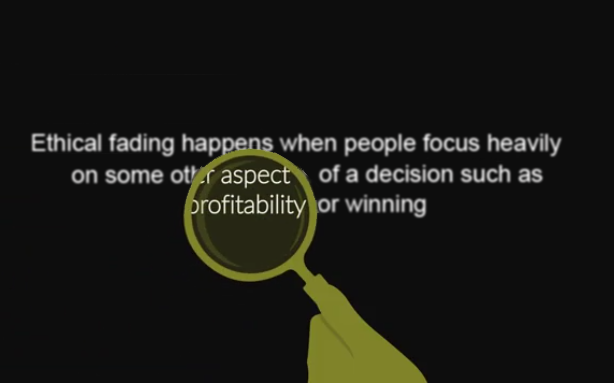When making decisions, we may find ourselves focusing only on what we want to see. This can make decision-making easier and quicker, but if we overlook or downplay the ethical aspects of our choices, we may experience ethical fading. We might see this on campus if:
- A hiring manager gives preference to a candidate they have a personal or familial connection to, rather than to another candidate based on their experience or merit.
- Reports of harassment are ignored or downplayed to protect a person’s or a department’s reputation.
- Only the benefits of a new process are advertised, while the negative aspects are ignored.
- Prioritization is given to funding for a grant proposal at the expense of ethical considerations, like participant welfare or data privacy.
- Safety protocols or environmental regulations are minimized to save time or reduce costs for a project.
This month's 1-minute video shows us how we might miss ethical issues if we are not explicitly looking for them.

Ethical fading can erode our ethical standards and lead to damaged trust, so how do we combat ethical fading?
- Foster a culture of integrity, transparency, and accountability: Promote open communication and be willing to discuss ethical concerns with supervisors or departments who have expertise on the topic you are concerned about.
- Implement robust policies and procedures: Establish clear guidelines and policies for your department or office and review them regularly. This can include documenting procedures or creating guides so that actions are consistent and relevant to support your goals and mission.
- Provide ethical training and support: Allow people time to think about situations before asking them to make a decision. For example, if you notice “groupthink” happening, take a moment to think more critically about the situation. Consider using the ethical fading video to generate discussions in your workplace about ways this topic applies to us at UT.
We encourage personal learning about these topics and want to help you make them a regular part of your conversations. There are free classes in UTLearn, as well as additional videos about business ethics on LinkedIn Learning and through Ethics Unwrapped.
As members of the UT community, we are all expected to uphold our University’s core values through integrity, honesty, trust, fairness, and respect toward peers and community. If you are facing a dilemma, consider talking about it with a friend, a supervisor or manager, the Ombuds Office, your local HR representative, or consult with us at University Risk and Compliance Services. Others may be able to help you see something you are missing.
If you think someone is behaving unethically or illegally, contact the Compliance and Ethics Hotline online or by phone at 877-507-7321 (English) and 800-216-1288 (Español). Anonymous reporting is available. Remember that UT Austin prohibits retaliation against anyone who raises a concern in good faith.

